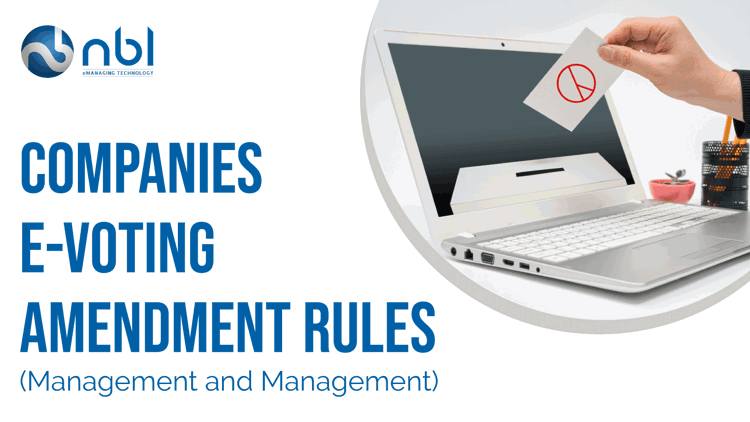Companies E-voting Amendment Rules (Management and Management)

Naapbooks Insights • E-voting Management • 5 min read
Company shareholders are free to express their assent or dissent over any decisions that require their approval by voting. It is not possible for participants to be present at each meeting physically. Imagine if a shareholder is in Mumbai and the meeting venue is at Panipat then how much will it cost? Not just in terms of money but also the cost of time.
Each vote counts, as it forms the essence of the organizational structure and decision-making. These days with so many precautions due to Covid it is simply not possible to schedule the meeting and invite a large group of stakeholders. If we conduct voting physically, chances of incorrect vote counting are high. With organizations and its systems going digital, voting too should be digital.
Therefore, a new section 192 A was inserted in the Companies Act, 2001, “Passing of Resolutions by Postal Ballot”. The law stated that voting by Postal Ballot includes electronic mode (E-voting).
Electronic voting is a process of casting votes using a computer-based system where voting can be done simultaneously on multiple devices using a secured portal. The results can be displayed in real time on the screen and could be easily shared to members as a downloadable report. E – Voting eases the voting process using a highly secured and transparent system.
Companies Amendment Rules (Management and Management), 2021
Summary of amendments
- The provisions of Section 23 (1) to apply w.e.f. 5 March 2021
- Installation of Aadhaar authentication option for GST registration of Company Incorporation
- Exceeds the requirement to attach Form No. MGT-9 in the Board report
- Submission of the new MGT 7 A form of annual return for OPC and small companies
- Substitution of definitions 20
- The MCA announced an amendment to Section 92 of the Companies Act, 2013
- Notice of commencement of provision of the Companies Act (Amendment) Act 2017 w.e.f. March 05,
- 2021 in respect of provisions relating to Annual Payment
Amended Rules-Companies Amendment Rules (Management and Management), 2021
Amendment 1: Rule 11- Annual Return
Existing Provisions
(1) Every company shall process its annual return on Form No. MGT. 7.
Amended Terms
(1) Every company may submit its annual return form to Form No. MGT 7 except Small Companies. They can file an annual return from the Financial Year 2020-21 on wards in Form No. MGT 7A
Amendment 2: Rule 12- Issue an annual refund
Existing Provisions
(1) The issuance of an annual return must be included in the Report of the Board which will be in Form No. MGT.9 It is not necessary for the company to attach an annual refund and Board report to Form No. MGT. 9, but in the event that the weblink of that annual return is disclosed in the Board’s report in accordance with subsection (3) of section 92 of the Companies Act, 2013
(2) A copy of the annual return shall be attached to the Registrar with the prescribed amount
Amended provisions
Compliance with the Act will be replaced by Act 12
Rule 12- Completion of Annual Return by Registrar
A copy of the annual refund will be submitted to the Registrar at such rate as may be specified for this purpose.
Amendment 3: Rule 20 – Voting by Technical means – Section 2 (Definitions)
Existing Provisions
(2) Every company that has listed its shares in a recognized stock market and all companies with less than a thousand members shall provide its members with the opportunity to exercise their voting right in the proposed decisions to be considered at an electronic meeting means:
Provided that Neha, or a business or institutional investor referred to in Chapter XB or Chapter XC of the Securities and Exchange Board of India (Issue of Capital and Disclosure Requirements)
Regulations, 2009 is not required to provide a polling station by electronic means:
Definition.- For the purposes of this sub-rule, “Neha” means a company established as a Neha for the purpose of cultivating the practice of savings among its members, receiving deposits and lending, to its members only, for mutual benefit, and in accordance with the laws of the Central Government.
Amended definitions after Proviso
Definition-I.- For the purposes of this sub-rule, “Neha” means a company established as Neha which aims to develop a practice of savings among its members, receiving deposits and lending to them, members only, for mutual benefit, and compliance with laws similar to those imposed by the Central Government.
Definition-II.- For the purposes of this Act, the expression-
(i) Agency means National Securities Depository Limited, Central Depository Services (India) Limited or another entity approved by the Department of Corporations on condition that National Securities Depository Limited, Central Depository Services (India) Limited or another entity obtains a certificate from the Directorate Testing and Quality Certification Directorate, Department of Information Technology, Ministry of Communications and Information Technology, Government of India including with regard to compliance with the definitions under definition (vi);
(ii) Decision date means a day not later than seven days before the date of the general meeting to determine the eligibility for voting by electronic means or at a general meeting;
(iii) Cut-off date means a date not earlier than 7 days before the date of general meeting for determining the eligibility to vote by electronic means or in the general meeting;
(iv) Cyber security means protecting information, equipment, devices, computer, computer resource, communication device and information stored therein from unauthorized access, use, disclosures, disruption, modification or destruction;
(v) Electronic voting system means a secured system based process of display of electronic ballots, recording of votes of the members and the number of votes polled in favor or against, in such a manner that the entire voting exercised by way of electronic means gets registered and counted in an electronic registry in a centralized server with adequate cyber security;
(vi) Remote e-voting means the facility of casting votes by a member using an electronic voting system from a place other than venue of general meeting’
(vii) Secured system means computer hardware, software, and procedure that-
(a) are reasonably secure from unauthorized access and misuse;
(b) provide a reasonable level of reliability and correct operation;
(c) are reasonably suited to performing the intended functions; and
(d) adhere to generally accepted security procedures;
SEBI has made it mandatory for certain listed companies to provide e-voting facility to its shareholders for resolutions which require Postal Ballot and for which notices are issued on or after 1st October 2012. It is important for regulators to keep an eye on the system to maintain transparency.
The e-voting process will completely follow the green initiative as there will be no physical collecting and counting of ballot papers, verification of signatures, and rejection of invalid votes.










